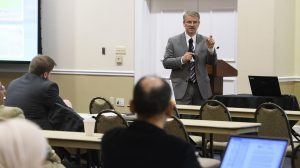
David Pittman, director of the U.S. Army Engineer Research and Development Center in Vicksburg, addresses the audience at the Infrastructure Objective Resilience Workshop held at the University of Mississippi. Photo by Thomas Graning/Ole Miss Communications
OXFORD, Miss. – Experts from around the country recently gathered at the University of Mississippi for a two-day conference on infrastructure resilience.
Hosted by UM and the UM School of Engineering, the Infrastructure Objective Resilience Workshop included university and federal experts in engineering, materials science, physical acoustics, geology, journalism, computer science, construction, psychology and hydroscience.
More than 80 stakeholders of the nation’s infrastructure sectors discussed the latest progress in objective resilience and talked about the need for transformative research that could lead to improving the nation’s infrastructure resilience against natural and man-made disasters.
The meeting included such federal agencies as the Federal Emergency Management Agency, the U.S. Department of Homeland Security, the Federal Insurance & Mitigation Administration, and the National Institute of Standards and Technology.
“The workshop gathered the nation’s leaders in infrastructure resilience and was aimed at fostering collaboration between the University of Mississippi, government agencies, government labs, industries and other academic institutions in an area of national importance,” said Ahmed Al-Ostaz, UM civil engineering professor and workshop coordinator.
“It was our hope that the workshop would be an important step towards unlocking the combined disaster resilience potentials and emphasize the role of the University of Mississippi and the state of Mississippi as the leader in addressing an issue of regional and national concern,” he said.
In his welcoming address, Chancellor Jeffrey S. Vitter said the importance of the workshop and the work of its attendees could not be overstated.
He also noted how the workshop tied into the university’s Flagship Constellations initiative, which includes multidisciplinary teams of faculty, staff and students creating solutions to challenges in the areas of big data, brain wellness, community well-being and disaster resilience.
“The University of Mississippi places tremendous value and importance on the work that you are addressing today,” he told attendees. “We have a strong foundation in this area, and our disaster resilience constellation marries insight and research from environmental and legal disciplines with materials science, information technology … along with a variety of disciplines.
“We’re focused on developing technologies, tools and policies to mitigate disasters and increase the resilience, security and sustainability of our communities.”
The workshop started March 27 with a keynote session by Eric Letvin, deputy associate administrator, mitigation directorate, Federal Insurance & Mitigation Administration, which is part of FEMA.
Letvin said during his address that FEMA’s 2018-2022 Strategic Plan includes building a culture of preparedness, readying the nation for catastrophic disasters and reducing the complexity of FEMA.
Mississippi’s geographical location makes it prone to disasters, including tornadoes, floods, hurricanes, heat waves and earthquakes. Reducing the impact of these disasters on local communities through increasing the resilience and sustainability of communities is one of the aims of the Disaster Resilience Flagship Constellation.
“Striving toward infrastructure resilience is of keen interest to the state of Mississippi, and as the state’s flagship university, the University of Mississippi is committed to advancing that goal,” Josh Gladden, UM interim vice chancellor for research and sponsored programs, told attendees. “The constellations bring together a diverse set of faculty from diverse disciplines that help address very large and complex problems.
“With engineers, scientists, legal and policy experts, medical professionals, communications specialists and social scientists all under one roof, I believe that universities are uniquely suited to build the kinds of teams that are needed to address such multidimensional problems and are obligated to do so.”
Other speakers were Jason Averill, chief of the Materials and Structural Systems Division of the Engineering Laboratory at the National Institute of Standards and Technology; Amar Chaker, director of the Engineering Mechanics Institute of the American Society of Civil Engineers; Ryan Colker, vice president of the National Institute of Building Sciences; Norma Jean Mattei, 2017 president of the American Society of Civil Engineers; David Pittman, director of the U.S. Army Engineer Research and Development Center; and David Wulf, deputy assistant secretary for infrastructure protection (acting), U.S. Department of Homeland Security.